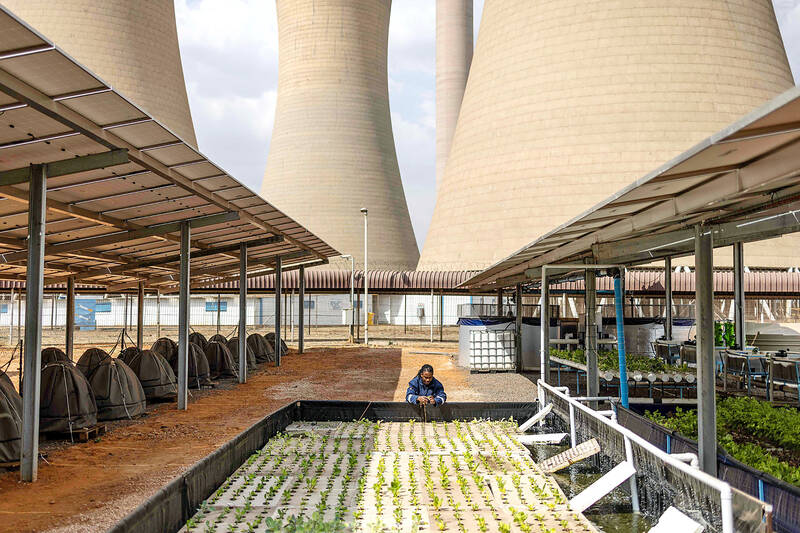The cold corridors of South Africa’s once-mighty Komati coal-fired power plant have been quiet since its shutdown in 2022 in what was trumpeted as a pioneering project in the world’s transition to green energy.
Two years later, plans to repurpose the country’s oldest coal power plant have amounted to little in a process that offers caution and lessons for countries intending to reduce their reliance on fossil fuels and switch to renewables.
Jobs have been lost and construction for wind and solar energy generation has yet to start, with only a few small green projects under way.

Photo: AFP
“We cannot construct anything. We cannot remove anything from the site,” acting general manager Theven Pillay said at the 63-year-old plant embedded in the coal belt in Mpumalanga province, where the air hangs thick with smog.
Poor planning and delays in paperwork to authorize the full decommissioning of the plant have been the main culprits for the standstill, he said.
“We should have done things earlier. So, we would consider it is not a success,” he said.
Before it turned off the switches in October 2022, the plant fed 121 megawatts (MW) into South Africa’s chronically undersupplied and erratic electricity grid. The transition plan — which won US$497 million in funding from the World Bank — envisions the generation of 150MW via solar and 70MW from wind, with capacity for 150MW of battery storage.
Workers are to be reskilled and the plant’s infrastructure, including its massive cooling towers, repurposed.
However, much of this is still a long way off.
“They effectively just shut down the coal plant and left the people to deal with the outcomes,” South African Deputy Minister of Energy and Electricity Samantha Graham said.
Coal provides 80 percent of South Africa’s power, and the country is among the world’s top 12-largest greenhouse gas emitters. Coal is also a bedrock of its economy, employing about 90,000 people. South Africa was the first country to form a just energy transition partnership (JETP) with international funders to move off dirty power generation, already receiving US$13.6 billion in total in grants and loans, South African presidential JETP committee member Neil Cole said.
Komati is the first coal plant scheduled for decommissioning, with five of the remaining 14 ones meant to follow by 2030. It had directly employed 393 people, the state energy firm Eskom that owns the plant said.
Only 162 remain on site as others volunteered for transfer or accepted payouts. The plant had been the main provider of employment in the small town, where the quiet streets are pitted with chunks of coal. Today, several houses are vacant as workers from other provinces headed home after losing their jobs.
“Our jobs ending traumatized us a lot as a community,” said Sizwe Shandu, 35, who had been contracted as a boilermaker at the plant since 2008.
The shutdown had been unexpected and left his family scrambling to make ends meet, he said.
With South Africa’s unemployment rate topping 33 percent, Shandu now relies on government social grants to buy food and electricity.
Pillay admitted that many people in the town of Komati had a “disgruntled view” of the transition.
One of the mistakes was that coal jobs were closed before new jobs were created, he said.
People from the town did not always have the skills required for the emerging jobs. Eskom has said it plans to eventually create 363 permanent jobs and 2,733 temporary jobs at Komati.
One of the green projects underway combines raising fish alongside vegetable patches supported by solar panels.
Seven people, from a planned 21, have been trained to work on this aquaponics scheme, including Bheki Nkabinde, 37.
“Eskom has helped me big time in terms of getting this opportunity because now I’ve got an income, I can be able to support my family,” Nkabinde said, as he walked among his spinach, tomatoes, parsley and spring onions.
The facility is also turning invasive plants into pellets that are an alternative fuel to coal and assembling mobile micro power grids fixed to containers. A coal milling workshop has been turned into a welding training room.
The missteps at Komati are lessons for other coal-fired power plants marked for shutdown, Pillay said.
For example, some now plan to start up green energy projects parallel to the phasing out of fumes.
However, the country is “not going to be pushed into making a decision around how quickly or how slowly we do the just energy transition based on international expectations,” Graham said.
South Africa has 7 percent renewable energy in its mix, up from 1 percent a decade ago, she said.
It would continue mining and exporting coal, with Eskom estimating that there are about 200 years of supply still in the ground.
The goal is to have a “good energy mix that’s sustainable and stable,” Graham said.
Since South Africa’s JETP was announced, Indonesia, Vietnam and Senegal have struck similar deals, but there has been little progress toward actually closing coal plants under the mechanism.
Among the criticisms is that it offers largely market-rate lending terms, raising the threat of debt repayment problems for recipients.

SETBACK: Apple’s India iPhone push has been disrupted after Foxconn recalled hundreds of Chinese engineers, amid Beijing’s attempts to curb tech transfers Apple Inc assembly partner Hon Hai Precision Industry Co (鴻海精密), also known internationally as Foxconn Technology Group (富士康科技集團), has recalled about 300 Chinese engineers from a factory in India, the latest setback for the iPhone maker’s push to rapidly expand in the country. The extraction of Chinese workers from the factory of Yuzhan Technology (India) Private Ltd, a Hon Hai component unit, in southern Tamil Nadu state, is the second such move in a few months. The company has started flying in Taiwanese engineers to replace staff leaving, people familiar with the matter said, asking not to be named, as the

The prices of gasoline and diesel at domestic fuel stations are to rise NT$0.1 and NT$0.4 per liter this week respectively, after international crude oil prices rose last week, CPC Corp, Taiwan (台灣中油) and Formosa Petrochemical Corp (台塑石化) announced yesterday. Effective today, gasoline prices at CPC and Formosa stations are to rise to NT$27.3, NT$28.8 and NT$30.8 per liter for 92, 95 and 98-octane unleaded gasoline respectively, the companies said in separate statements. The price of premium diesel is to rise to NT$26.2 per liter at CPC stations and NT$26 at Formosa pumps, they said. The announcements came after international crude oil prices

STABLE DEMAND: Delta supplies US clients in the aerospace, defense and machinery segments, and expects second-half sales to be similar to the first half Delta Electronics Inc (台達電) expects its US automation business to remain steady in the second half, with no signs of weakening client demand. With demand from US clients remaining solid, its performance in the second half is expected to be similar to that of the first half, Andy Liu (劉佳容), general manager of the company’s industrial automation business group, said on the sidelines of the Taiwan Automation Intelligence and Robot Show in Taipei on Wednesday. The company earlier reported that revenue from its automation business grew 7 percent year-on-year to NT$27.22 billion (US$889.98 million) in the first half, accounting for 11 percent

A German company is putting used electric vehicle batteries to new use by stacking them into fridge-size units that homes and businesses can use to store their excess solar and wind energy. This week, the company Voltfang — which means “catching volts” — opened its first industrial site in Aachen, Germany, near the Belgian and Dutch borders. With about 100 staff, Voltfang says it is the biggest facility of its kind in Europe in the budding sector of refurbishing lithium-ion batteries. Its CEO David Oudsandji hopes it would help Europe’s biggest economy ween itself off fossil fuels and increasingly rely on climate-friendly renewables. While